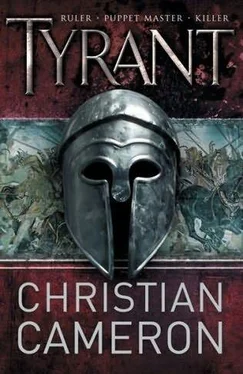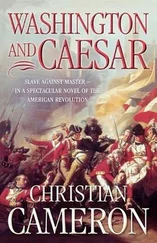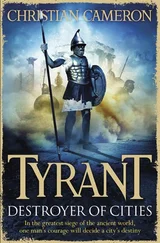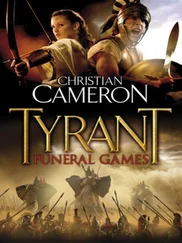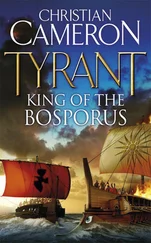Christian Cameron - Tyrant
Здесь есть возможность читать онлайн «Christian Cameron - Tyrant» весь текст электронной книги совершенно бесплатно (целиком полную версию без сокращений). В некоторых случаях можно слушать аудио, скачать через торрент в формате fb2 и присутствует краткое содержание. Жанр: Исторические приключения, на английском языке. Описание произведения, (предисловие) а так же отзывы посетителей доступны на портале библиотеки ЛибКат.
- Название:Tyrant
- Автор:
- Жанр:
- Год:неизвестен
- ISBN:нет данных
- Рейтинг книги:4 / 5. Голосов: 1
-
Избранное:Добавить в избранное
- Отзывы:
-
Ваша оценка:
- 80
- 1
- 2
- 3
- 4
- 5
Tyrant: краткое содержание, описание и аннотация
Предлагаем к чтению аннотацию, описание, краткое содержание или предисловие (зависит от того, что написал сам автор книги «Tyrant»). Если вы не нашли необходимую информацию о книге — напишите в комментариях, мы постараемся отыскать её.
Tyrant — читать онлайн бесплатно полную книгу (весь текст) целиком
Ниже представлен текст книги, разбитый по страницам. Система сохранения места последней прочитанной страницы, позволяет с удобством читать онлайн бесплатно книгу «Tyrant», без необходимости каждый раз заново искать на чём Вы остановились. Поставьте закладку, и сможете в любой момент перейти на страницу, на которой закончили чтение.
Интервал:
Закладка:
Phillip Kontos, the Macedonian noble who commanded the Allied Cavalry, raised a hand in the air. Kineas’s whole body gave a great shake and his horse shied a step, and then another, his tension communicated to the beast through his knees. He’d faced Persian cavalry just once before. He knew they could ride better than most Greeks and that their horses were larger and fiercer. He prayed to Athena.
Niceas started to sing the Paean. In five words, every man in the front rank had caught it up, the volume of sound swelling and spreading like flame in an autumn field, a fire of song that sent sparks shooting across to the Thessalians behind them. The Persian cavalry was at midstream, a solid front of horsemen.
Kontos dropped his hand. The Allied Cavalry began to walk forward, the horses excited, heads up, tails lashing. Kineas transferred his light javelin from his bridle hand, determined to perform a feat of arms he had practised for five years — to throw his first javelin and fight with his second, all at the gallop. He measured the ground to the front of the Persian cavalry. The mass of Greek cavalry began to move faster, through a trot and into a canter, the Paean shredding away as the hooves of the horses pounded out the sound. Kineas’s mount left the sand and started down the shallow gravel bank of the Pinarus. He clenched his fist, signalling the charge, and Niceas’s trumpet rang out.
He was done being an officer. Now he would be a warrior. The wall of Medes in front filled his eyes and the tension in his shoulders, and his gut fell away. His mare’s head stretched out with her stride, reaching a gallop. He jammed his knees and thighs like a clamp on her back and rose, his back straight, and flung his javelin at the closest Persian. And his weapon hand travelled down, following through, grabbing his second javelin and bringing it up as his horse’s hooves bit into the water of the stream and she collided, almost head on, with the mount of the man he’d killed — his javelin through the man’s body — his little mare like an equine javelin, knocking the larger Persian horse down into the water, its hooves flailing. A blow against his unshielded left side connected with his helmet and his arms, pain — Kineas lunged at a big man with a red beard, swinging the head of his fighting spear like a long club, parried, and his own spear broke at the impact, the bronze head cutting the Persian’s cheek as they passed so close that their knees touched. And red beard was now behind him and he was unarmed. His horse was up to her knees in the water, her momentum spent and one of the Persian horses slammed into her, chest to chest and head to head, so that both beasts rose out of the water like duelling personifications of the river god, droplets a fountain of fire in the sun. The Persian stallion’s rider lunged with his spear and Kineas twisted away and lost his seat. In an instant he was under the water, the riot of sound cut off. In a beat of his heart Kineas had his feet under him despite the weight of his armour, and his sword found its way into his hand as his head returned to the air and the din.
His mare was gone, pushed aside by the bigger Persian horse. Above him towered a huge grey. Kineas hacked at the rider’s leg — a clear blow, blood blew from the wound and then the rider was in the water and Kineas was scrambling to mount, one hand locked in the grey’s long blond mane, the other with a death grip on the hilt of his sword, the water dragging at his legs and his heavy breastplate pressing him down at every attempt to mount.
A weapon rang off his helmet, turning it so that he was blind. A blade scored across his upper arm, scraped across the bronze of his cuirass and then bit into his bridle arm. The grey, startled, bolted forward and dragged him out of the stream and up the bank he had so recently left, hanging from her mane, which panicked her so that she tossed her mighty head. Luck, and the strength of her neck, dragged him a hand’s breadth higher than his best effort had reached before, so that he got a knee over her broad back. Another horse rammed into his side — the blessing of the Goddess, as the new opponent served to push him up on to his new mount’s back, although the stallion’s teeth wreaked a toll on the bare flesh of his thigh. He struck out blindly across his own body with his sword and it bit into flesh. With his bridle hand he ripped the helmet clear of his head and flung it at the enemy he could now see, with his sword hand he cut again, this time with intent, and his man was down.
Kineas couldn’t reach the reins. His knees were locked on the big mare’s back but he couldn’t get her turned, and his back was to the enemy, his breastplate a sure sign that he was a Hellene and an enemy. He couldn’t even see another Greek. He cut at a man coming behind him with a levelled spear and missed completely, almost losing his seat again, but the man with the spear rode by.
Reckless — or hopeless — Kineas leaned out across his new mount’s neck and grabbed at the dangling reins again — missed, again — had them — too hard a pull and his mount was backing, rearing, then down on four feet. He turned into the stream and cut at a Persian. The man shied. Kineas thumped his heels into the flanks of his horse and she moved deeper into the stream, bit savagely at a stallion in her path while Kineas killed his rider, pushed further forward into the mass of Persians, and then he was on gravel, across the stream, pressed into a mass of enemies who could neither advance nor retreat because of their numbers.
He was an evil surprise to them, pressed so close that their javelins were useless and even his sword was too long and his arm burned with effort every time he raised it. He was deep in their formation. He didn’t think or plan. He hacked and hacked and when the heavy sword was wrenched from his hand by the weight of a victim and the fatigue of his hand, he took his dagger from his belt, pressing his next enemy close so that he could smell the cardamom on the man’s breath as he rammed his dagger into his armpit. He hugged his victim to him like a tired wrestler and the body was struck a mighty blow that rocked him back on his mount. He let go and the body fell between the horses. A javelin hit Kineas at the edge of his breastplate, the head punching into the sinew of his neck muscles before falling free. He tried to parry another blow but his left hand wouldn’t obey and the man struck his cuirass with a sword so that it bruised his side, and then his horse pushed ahead and the man was gone.
He was at the top of the bank. He had crossed the river and he felt as unafraid as if his spirit was high in the aether or already on the road to Elysium — detached, aware in the last instants of his life that he was alone in the midst of his enemies, wounded ten times.
The instants stretched — this is how the gods feel time — and he was not dead. Or perhaps he was — he could only see as if down a long hall, so that it was difficult for him to feel threatened by the Persian he could see at the end of the tunnel in his head. He wanted to shout back across the minutes to the boy who had started the charge — We will be a hero, you and I. The thought made him smile, and then the tunnel spun and he felt a great blow on his back, sharp pain biting on his neck and heels.
He didn’t know until later that his boyhood friends Diodorus and Laertes stood over his body like Ajax and Odysseus and kept the Persians off until the battle was won.
He didn’t know until later that his action had broken the Persian cavalry.
He recovered quickly, but not quickly enough to wear the wreath of laurel that Alexander awarded him as the bravest of the allies, or to hear his name cheered by the army. The wreath was pressed between boards of cedar in his baggage. Two years later another pair of cedar boards was pushed in beside it, pressing another wreath, one that cost him a scar five hands long down his right leg.
Читать дальшеИнтервал:
Закладка:
Похожие книги на «Tyrant»
Представляем Вашему вниманию похожие книги на «Tyrant» списком для выбора. Мы отобрали схожую по названию и смыслу литературу в надежде предоставить читателям больше вариантов отыскать новые, интересные, ещё непрочитанные произведения.
Обсуждение, отзывы о книге «Tyrant» и просто собственные мнения читателей. Оставьте ваши комментарии, напишите, что Вы думаете о произведении, его смысле или главных героях. Укажите что конкретно понравилось, а что нет, и почему Вы так считаете.
